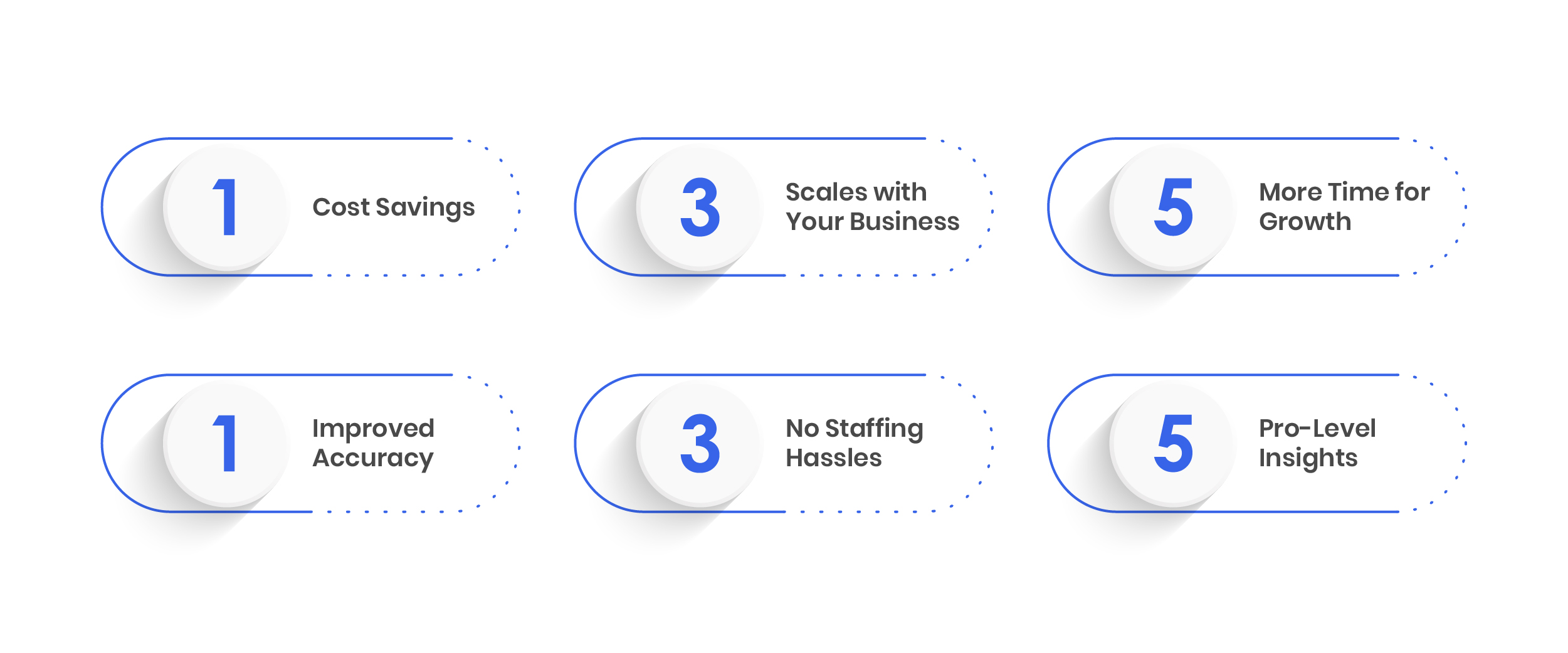Good financial management keeps your business strong. Choosing in-house or outsourcing affects more than salaries; it impacts efficiency, growth, and savings.
Managing your own accounting team may seem like the right move, but it can actually cost you more. An in-house accountant, billing clerk, and finance controller can cost up to $218,800 per year. But, outsourcing can cost $57,600 a year for the same roles saving you over 70%. Outsourcing at $10–$20/hr cuts costs and provides expert support. Many providers offer flexible, need-based pricing.
In-house or outsource? Outsourcing offers more flexibility and savings. Let’s see why outsourcing might be smarter.
In-House Accounting: What It Costs
In-house teams have fixed costs like salaries, benefits, and tools, even during slow times. As your business grows and needs more support, those costs rise.
Doing your accounting in-house might seem easy at first, but it has some big downsides. It costs a lot even if a small team needs salaries, space, and training. If someone quits, you have to spend more to replace them. Outsourcing is cheaper because you only pay for what you need. In-house teams may not know everything, but outsourced firms have experts for tax, payroll, and more. And as your business grows, it’s hard to hire fast enough. With outsourcing, you can scale up quickly without any hiring stress.
According to Forbes,In 2020, companies turned to outsourcing to cut costs and shift to remote work. Gartner said IT outsourcing would grow by 5.5% in 2021. It helped businesses skip the time and cost of hiring full-time staff. Google and Slack outsource to save money, access expert help, and manage staffing challenges. Deloitte found outsourcing boosts efficiency and handles more work without extra hiring.
Communication solves time and language gaps. Many now blend in-house for core work and outsource support. This mix offers both control and flexibility. Even tech giants outsource Google for IT support, Alibaba for product quality, and WhatsApp for early development. Whether scaling or saving, outsourcing helps businesses grow smarter.
Outsourced Accounting: Pay for What You Use
 Outsourcing lets you pay only for what you need, cutting costs and helping you budget. No hiring, training, or software needed firms handle it all.
Outsourcing lets you pay only for what you need, cutting costs and helping you budget. No hiring, training, or software needed firms handle it all.
Why do many businesses now choose outsourced accounting?
✅ Cost Savings No full-time salaries or benefits pay for the work you need.
✅ Scales with Your Business Need extra help during peak times? Outsourced teams adjust easily.
✅ More Time for Growth Focus on running your business not on spreadsheets or taxes.
✅ Improved Accuracy Experts stay updated on tax laws and use the latest tools to reduce errors.
✅ No Staffing Hassles No worries about hiring, training, or turnover your work keeps moving.
✅ Pro-Level Insights Get expert advice to grow your business.
Outsourcing Cost Comparison

There are different costs to think about. Direct costs are the set fees you pay the outsourcing company. Indirect costs include time spent setting up or fixing errors. Outsourcing also lowers overhead like office space, tools, and utilities. When doing an outsourcing cost comparison, many businesses cut costs by 50% or more. Outsourcing also makes it easier to grow. You can scale up or down without the hassle of hiring or firing. Plus, you get access to skilled professionals and the latest tools. Compare outsourcing cost comparison vs. in-house to see true spending and savings.
Internal vs. External Finance
Internal vs. external finance shows how a business can either use its own resources or rely on outside help. Internal vs. external finance depends on need, urgency, and cost.
| Internal Finance | External Finance | |
| What is it? | Money from inside the business. | Money from outside the business. |
| Examples | -selling products -collecting payments -selling old stuff |
-bank loan -credit cards -selling shares. |
| Used for | Small or daily needs | Big projects or costs |
| Who gives it? | The business itself | Bank or investor |
| Control | You keep full control | You may share control or pay interest. |
| Easy to get? | Yes, if business is doing well. | Harder, but helpful when growing. |
| Extra Cost? | No | Yes, may include interest or fees. |
Key Differences Between Inhouse Vs. Outsourcing
Control vs. Flexibility
In-house accounting offers control and quick access, but support may lack during absences or busy times. Outsourced services offer flexible support without hiring or firing hassles.
Cost & Value
Maintaining an in-house team is expensive. A solo accountant may cost $80K/year, while a full team can cost up to $351K. Outsourcing costs less, with fixed fees from $3,600 to $25,000 a year. Pay only for what you need and cut overhead costs.
Skills, Training & Insights
In-house hires need training and gear, costing over $4,700 per person. Outsourced teams bring ready expertise, no training needed. They also help with budgeting, forecasting, and planning.
Data Security
When using in-house teams, you’re responsible for setting up and maintaining data security tools. Outsourced firms invest in secure systems, encryption, and regular audits. It’s important to ask providers about their specific security practices.
Oversight & Accuracy
In-house accounting requires close supervision to maintain accuracy. Outsourced firms ensure accurate work with built-in quality controls.
Risk & Fraud Prevention
A limited in-house team increases the risk of errors or fraud. Outsourced firms reduce this risk by using many reviewers and strict internal standards.
Reliable Coverage
If someone quits or gets sick, in-house work may stop. Outsourced teams have backups to keep work running.
Up-to-Date Knowledge
One accountant may struggle to keep up with changing tax laws. Outsourced experts know the rules, helping you stay legal and save money.
Scalability
Building an in-house team takes time and effort. Outsourcing grows with your business.
Focus on Growth
Managing in-house accounting can divert your attention from strategic growth. Outsourcing frees up your time so you can concentrate on expanding your business.
| In house Team | Outsourced Firm | |
| Cost | High | Lower |
| Skills | Limited | Expert team |
| Growth | Slow to scale | Easy to scale |
| Tools | Need to buy | Included |
| Focus | Takes your time | Saves your time. |
Conclusion
There’s no one answer: big firms go in-house, small ones gain more from outsourcing. Outsourcing brings expert help, savings, less hassle, and better tools.
In-house offers control but costs more. Outsourcing is simpler, flexible, and cheaper. Cut costs, save time, and grow. Ready to switch? Work with a trusted firm and move ahead.


